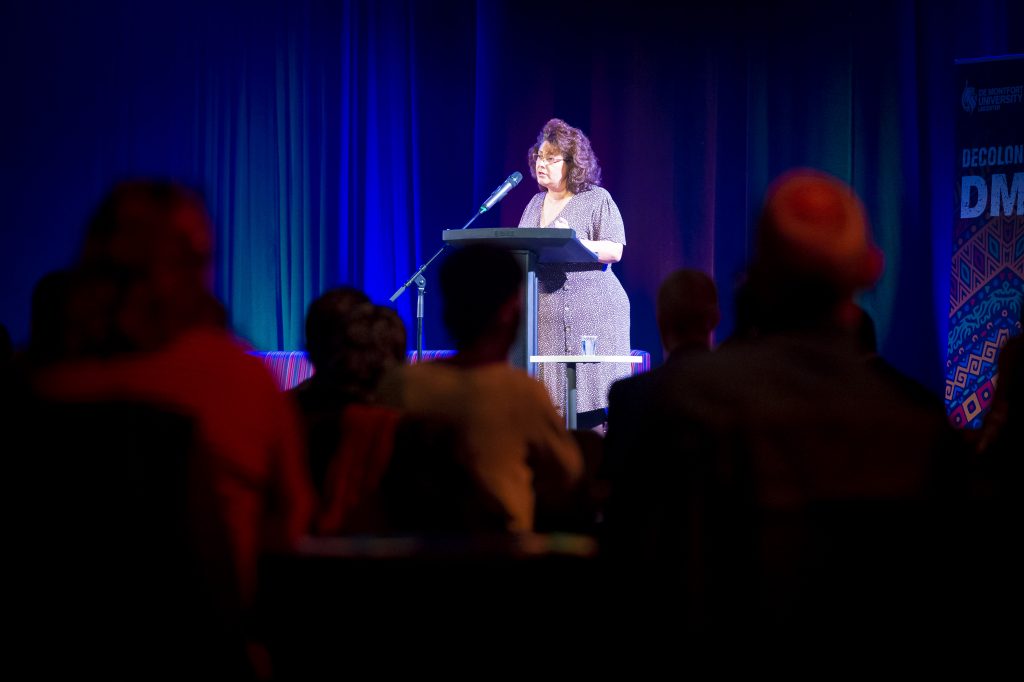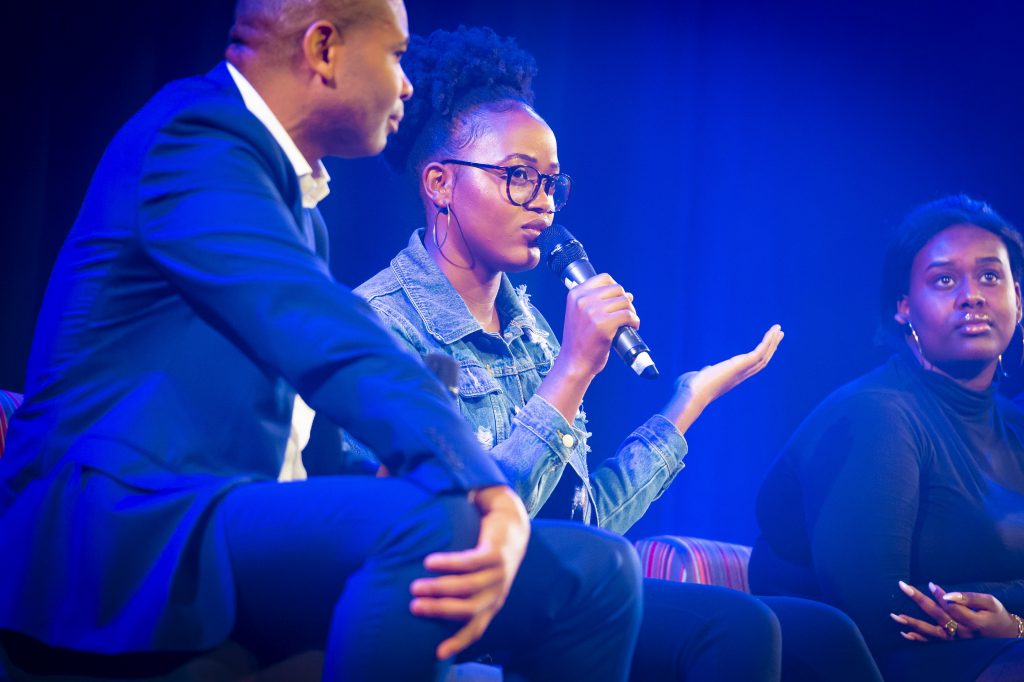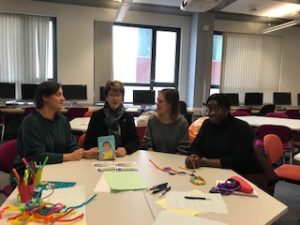What does Decolonising DMU mean?
I am interested in changing things but not sure what you mean by the term Decolonising.
Decolonisation tends to be understood within the context of the removal of forces who have taken over a geographical space. However, it also refers to the decolonisation of mindset – eradicating ideas imposed or brought by the colonisers which deemed the colonised society and their way of life, education, or cultural practices as inferior. As such, decolonising is not easy to define. Universities are principle sites of the production of knowledge, but it is also recognised by some that the knowledge shared and re-produced within UK Universities can often exclude non-Eurocentric points of views and essentially either marginalises them or dismisses them all together (Cupples and Grosfoguel, 2018). However, as the student body within the UK becomes increasingly diverse it is the time to recognise and reflect their perspectives within the curriculum as opposed to maintaining the legacy of colonialism by presenting white, western knowledge as the only form of knowledge.
Below are links to some resources which will give you an idea of what decolonising means within the context of Decolonising DMU. You can also attend Decolonising workshop sessions and the Community of Practice to learn more (see below regarding information on these sessions).

An Introduction by Project Director Kaushika Patel is here
Our work on Decolonising DMU is grounded in a developmental conceptual analysis, through which it serves as a basis for our activities in each strand. As a result, it also supports discussion about why the work is important. Therefore, the team have produced a working position paper, which is available here
Is the definition of Decolonising DMU a working definition or will it be likely to change?
There is no one agreed definition of what decolonising is or what it looks like. The definition on the website has always been a working definition as we recognise that it is likely to evolve as Decolonising DMU develops and moves forward. Following further conversations within the University community, however, we are moving away from using this as a definition and instead considering this an underpinning philosophy of practice
For more information, please see above resources.
Do you think using the term anti-racist in the Decolonising DMU definition suggests that the University is racist?
The use of the phrase ‘building an anti-racist university’ acknowledges that at present all institutions (including DMU, but not exclusively DMU) participate in practices which have negative outcomes for particular groups based on their race and ethnicity (as well as other characteristics such as gender and disability).
The media has been publicising the existence of a degree attainment gap in UK universities, which is defined as the difference in top degrees – a first or a 2:1 awarded to white students and those from an ethnic background for a number of years. The is no clear single definition of racism, therefore racism manifests in individual prejudice, but also institutional racism and discrimination, as articulated by the Macpherson Report . The Macpherson reports defines institutional racism as the “the collective failure of an organisation to provide an appropriate and professional service to people because of their colour, culture, or ethnic origin. It can be seen or detected in processes, attitudes and behaviour which amount to discrimination through unwitting prejudice, ignorance thoughtlessness and racist stereotyping which disadvantage minority ethnic people.” (Macpherson,1999, paragraph 6.34)
Therefore, as an institution we recognise that in order to build an anti-racist university, we must acknowledge the racism which exists in all institutions, including ours. The work of the project is to actively work against racism in all its forms. For more information, please see above resources.
I have worked here for years and find the university very inclusive and friendly and have never experienced or seen racism.
It is great that you have had such a positive experience of DMU. However, that may not be the experience of everyone on campus. We do get a small number of reports of racist incidents/harassment from staff and students every year and we also recognise that many people choose not to report for a variety of reasons. We must not be complacent, and this is why Decolonising DMU plays an important role in working to transform the experiences of staff and students at DMU.
What are the main differences between the Freedom to Achieve project and Decolonising DMU?
The main focus of the Freedom to Achieve Project was on reducing the BAME (Black, Asian and Minority Ethnic) attainment gap, also referred to as differential degree awarding. The attainment gap is a publicised issue affecting all Universities in the UK (Guardian 2019 article). For the project 40 programmes were chosen across the four faculties to participate in Freedom to Achieve. The project focused entirely upon academic staff, teaching, assessment and delivery and the student experience.
In contrast, Decolonising DMU is much broader and involves the entire university community, including both professional services and academic staff as well as students. The remit of Decolonising DMU extends beyond differential degree awarding and encompasses 5 distinct work streams: Institution, Staff, Students, Research and Library, and thus capturing the wide range of work and departments within the university. You can find out more about Decolonising DMU and the various work streams on this website.
I have attended a workshop in the past in relation to the Freedom to Achieve project, do I need to attend the Decolonising DMU workshops?
The Freedom to Achieve (FTA) workshops were specific to the aim of reducing differential degree awarding (or the BAME attainment gap). The workshops which are running as part of Decolonising DMU focus on issues relating to decolonising much more broadly and are also relevant to professional services colleagues. We would therefore recommend attendance at the Decolonising DMU workshop sessions for all staff. Please select the one that best describes your role ie Professional Services or Academic.
Is Decolonising DMU aimed at international students only?

Decolonising DMU is not specifically aimed at international students only. The data about the Attainment Gap in the UK refers to home students and is currently 13.2% (AdvanceHE 2019). Freedom to Achieve and Decolonising DMU focus upon students of colour. However, the impact of Decolonising DMU will affect all students.
There seems to be staff workshops and also a Community of Practice. What are the differences? Do I need to attend all of them?
Community of Practice (CoP): The aim of the CoP is for staff (both academic and professional services) to have the opportunity to influence and shape the direction and approach that DMU is taking in its journey to Decolonising DMU. The community is a place that provides support and stimulates discussions about what, where, how and who can effect change.
The purpose is to provide a safe environment, where potentially difficult and sensitive issues can be discussed. Sessions are intended to be cross-disciplinary and academic and professional services staff are welcome. The CoP aims to build on some of the conversations, which were started at the ‘Radical Pedagogies: Macpherson 20 Years On’ conference held in September 2019 at DMU. We want to ensure that the conversations about racism, pedagogy, teaching practice and decolonising, which took place at this conference, continue.
Workshop Sessions: The workshops aim to get participants thinking about what Decolonising DMU means in their own working contexts. For example, what could decolonising the curriculum mean to you? How can you make your learning and teaching more inclusive? What could decolonising mean for marketing and recruitment activities, or security and #DMUGlobal staff? How can you make your practices more inclusive? Participants have an opportunity to discuss the meaning of ‘decolonising’ as well as to consider practical examples of what Decolonising DMU might look like in their own areas of professional practice.
The aims of the workshops are:
- To consider the meaning of Decolonising DMU in context
- To discuss practical examples of what Decolonising DMU looks like
- To share best practice
You can sign up to the workshops via the staff development tab, MyDevelopment.
Staff Drop-in Sessions: The Decolonising DMU team run drop–in sessions for staff who have questions about Decolonising DMU generally, or would like more advice about how Decolonising DMU applies to their own working areas. These sessions are advertised to staff via the internal communication systems as well as being advertised on the Decolonising DMU website.
Why are the Community of Practice sessions not held on the same day?
We would like the Community of Practice meetings/sessions to be as open and accessible to as many staff as possible. By rotating the days and times of the meetings we aim to ensure that as many staff can participate as possible, even if they can’t attend all the meetings. Holding meetings on the same day/time might mean that some staff can never attend e.g. due to regular teaching commitments, other meetings scheduled at the same time or other commitments such as caring or childcare responsibilities.
Even if you haven’t attended any of the prior Community of Practice meetings please feel free to join in and attend your first meeting. We do not anticipate staff being able to attend every meeting due to their work commitments.
Do I have to check with my line manager to attend any of the events?
As Decolonising DMU is a strategic priority for DMU and includes all staff, academic and professional services, then all staff should be enabled to attend. All staff would be expected to liaise with their manager to advise they wish to attend a CoP and with sufficient notice given managers would be expected to support staff. Where a member of staff cannot be released due to work commitments which no one else in the team can cover then the ideal situation would be a negotiation that the next time a Community of Practice is advertised that member of staff should be enabled to attend. It is also worth considering including an objective in your appraisal connected to your staff development AND an objective to support Decolonising DMU. However, if staff continue to experience barriers from management then they should contact the project team who will look to support them further.
Can I get a certificate of attendance or some acknowledgement/recognition in my staff development record for my involvement and attendance?
There is no formal recognition for attending events such as the Community of Practice meetings/sessions or Read to Debate. However, if you attend the workshop sessions and have booked via Staff Development, this should be recorded in MyDevelopment.
Who do I contact to hear more about getting involved?
If you are interested in the Community of Practice contact Melanie Crofts – melanie.crofts@dmu.ac.uk
If you want to know more about the Decolonising DMU work streams contact: Institutional – Kaushika Patel – kpatel07@dmu.ac.uk
Staff – Melanie Crofts – melanie.crofts@dmu.ac.uk
Students – Mark Prescod – mprescod@dmu.ac.uk
Library – Kaye Towlson – Kbt@dmu.ac.uk
Research/Evaluation – Lucy Ansley – lucy.atkins@dmu.ac.uk
What do the Read to Debate sessions involve?
Read to debate is a self- selecting reading group offered by the Library and Learning services Fair Outcomes Champion Kaye Towlson. The forum offers an opportunity for staff to come together and discuss a selection of relevant material around the subject and experience of decolonising within H.E. Stimulus materials are provided and people are invited to read, think and reflect on the implications and connections offered by this material with their experience and practice within Higher Education. Read to Debate meetings offer a forum for individuals to then share their thoughts and think about their practice.
 Reading material is a mix of academic i.e. journal articles, book chapters, through to blogs, journalism/commentary, academic websites, more mainstream books and may include podcasts and videos as appropriate. Meetings are approximately every two months, attendees come from across the University and staff from University of Leicester have also attended. Groups are relatively small (average 5-6) with occasionally larger turnouts (12). Attendance is voluntary and self-selecting and at the moment, is staff only; this could be opened up to include students in the future.
Reading material is a mix of academic i.e. journal articles, book chapters, through to blogs, journalism/commentary, academic websites, more mainstream books and may include podcasts and videos as appropriate. Meetings are approximately every two months, attendees come from across the University and staff from University of Leicester have also attended. Groups are relatively small (average 5-6) with occasionally larger turnouts (12). Attendance is voluntary and self-selecting and at the moment, is staff only; this could be opened up to include students in the future.
Where can I see examples of best practice to look at?
You can see examples here
I have heard the term “unconscious bias.” But I do not fully understand what it means?
People tend to have three main types of biases:
- Conscious/explicit bias, which are that we know and are aware of.
- Unconscious bias, which are biases we are not aware of. Our brain automatically makes quick judgments and assessments of people and situations, influenced by our background, cultural environment and personal experiences.
- Implicit bias, which are views and opinions which we may not be aware of.
It is important we are aware of the potential to be influenced by any bias and stop this when we see this arising. Bias matters as it stops people performing as well as they can. It means we don’t get the most out of our staff and students and they don’t perform to their potential as a result.
A new bias training resource is currently in development, however, in the meantime, for further information on bias and how to prevent this, please visit the training resources available on the ‘mandatory and online training for staff’ community. Or check out Advance HE materials here
What does White Privilege mean?
The term is widely understood to acknowledge the inherent advantages possessed by a white person on the basis of their race in a society that characterised by racial inequality and injustice. This does not mean that white people haven’t suffered hardships and difficulties or have a tough life – it just means that the colour of their skin hasn’t made their life harder.
What does the term microaggression mean?
This is understood to be a statement, action, or incident where one person perpetuates indirect, subtle or unintentional discrimination against a member of an ethnic minority.
You might find the following resources helpful:
What is a microaggression?
The tiny ways prejudice seeps into the workplace BBC Article
Black Women often suffer microaggressions at work
You must be logged in to post a comment.